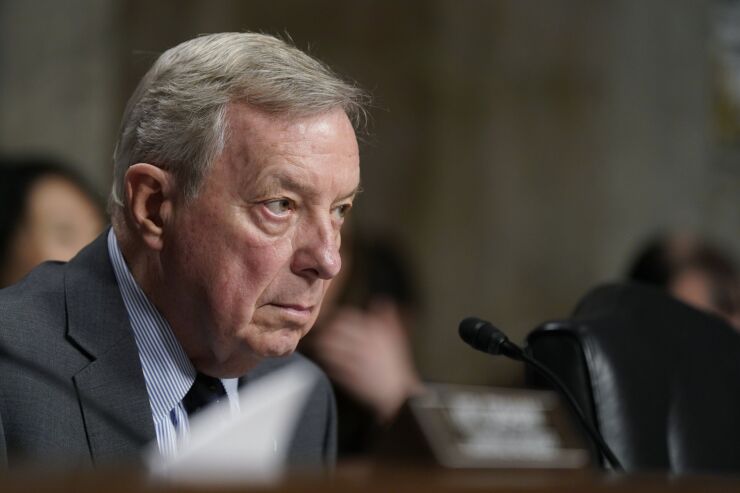
WASHINGTON — Sens. Dick Durbin, D-Ill., and Roger Marshall, R-Kansas, have added two new cosponsors to their bill that would overhaul the rules governing so-called "swipe fees."
Banks have fiercely opposed the Credit Card Competition Act, which would require cards from banks with $100 billion or more of assets to offer merchants the choice of two unaffiliated card networks that aren't both Visa and Mastercard. The bill's sponsors say that it would lower fees and promote competition, while its detractors say that it's a giveaway to retailers and would increase costs for consumers.
While the bill
"This shows that support is growing across the country and across the political spectrum for action that would bring competition to credit card swipe fees," said the National Grocers Association head lobbyist Chris Jones in a statement.
Sens. Josh Hawley, R-Mo., and Jack Reed, D-R.I., signed on to the legislation on Wednesday. The bipartisan pair join Sens. Peter Welch, D-Vt., and J.D. Vance, R-Ohio, who
"For years, Visa and Mastercard have taken advantage of their duopoly in the credit market to impose extreme fees on small merchants and retailers," said Hawley in a statement. "This legislation will grant Main Street relief from Wall Street's extortionate business practices."
The new support comes days after Durbin asked the CEOs of Visa, Mastercard, United Airlines, and American Airlines to testify in front of the Senate Judiciary Committee, where Durbin serves as chairman. The hearing is tentatively scheduled for April 9.
The chances of the bill eventually passing into law remain slim, experts said, amid a still-divided Congress.
"I still think it's unlikely to become law," said Ian Katz, a managing director at Capital Alpha Partners. "The additional cosponsors and the hearing increase the bill's chances, but only marginally."
"These developments will cause some anxiety in the industry, and the hearing creates headline risk," Katz said.
Jaret Seiberg, a managing director at Cowen Washington Research Group, said in a note that the hearing shows that Durbin and Marshall lack the votes to get the bill out of the committee.
"The strategy is to show how credit card interchange benefits big financial companies and a few airlines at the expense of small merchants," he said. "This is a smart political move if the senators are able to keep the hearing focused on this theme."
But given its proposed timing, the hearing likely shows that the bill's sponsors have not yet secured the bill's place in must-pass legislation. The most urgent bills in Congress at the moment, Seiberg said, are related to spending, foreign aid, and border security.
"We see their decision to schedule a hearing as a sign of weakness," Seiberg said. "The reason we are not lowering our odds is because we question if senators would be willing to derail a broader legislative package just because credit card interchange was included. In other words, we don't see this having the votes to pass on its own. Yet opponents may not have the votes to stop it if it is combined with other priorities that have broad support."






